
Hussain breaks mold of a trustee
8/26/2007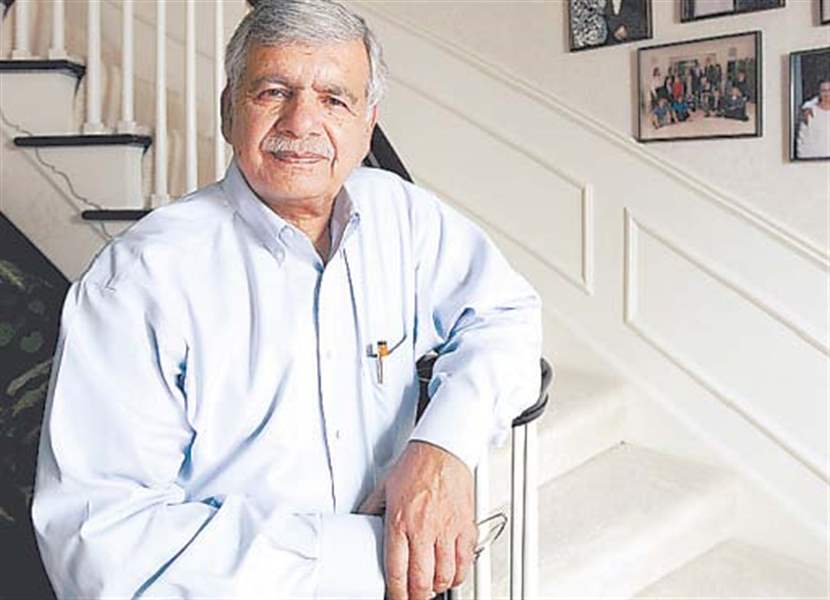
Dr. S. Amjad Hussain is a retired surgeon, medical professor, accomplished author, and columnist for The Blade.

Dr. S. Amjad Hussain is a retired surgeon, medical professor, accomplished author, and columnist for The Blade.
Name the one University of Toledo trustee who has saved lives on the operating table, speaks multiple languages, struggled with chemistry, and whose world travels include time spent with Afghanistan s murderous Taliban just months before Sept. 11.
The answer is S. Amjad Hussain, retired surgeon, medical professor, and accomplished author and columnist for The Blade since the mid 1990s. He also is a past president of the Academy of Medicine of Toledo.
Gov. Ted Strickland appointed Dr. Hussain to the UT board earlier this month, after two other trustees terms expired July 1. UT trustees are appointed to nine-year terms.
Not surprisingly to his colleagues and friends, the man they call Amjad greeted his appointment with excitement, modesty, and overflowing enthusiasm.
Institutions make a difference in the lives of people, and for that reason I am excited about this opportunity. I have this old medieval concept of universities being the center of a city, the center of civilization, said Dr. Hussain, a bushy-haired 70-year-old of medium height who favors tweed jackets and a warm smile.
I would like to sit back and learn and contribute what I can.
Few who know him have any doubt that he has a lot to contribute. His expertise is apt to be highly useful as the transition between the merged UT and former Medical University of Ohio boards continues over the next few years and the board shrinks from 17 members to nine.
University trustees tend to be business people or former politicians. Dr. Hussain, a Pakistani native who has lived here for more than 40 years, breaks that mold.
In many ways, he is regarded as sort of a walking human university by those who know him. He is able to speak knowledgeably on subjects from heart transplants to hunting techniques.
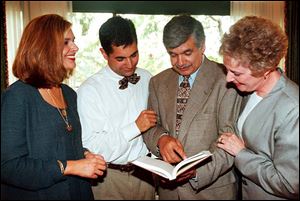
Daughter Natasha Hussain- Black, left, son Monie Hussain, S. Amjad Hussain, and his late wife, Dorothy, at a book signing in 1998.
His pleasant and instantly recognizable voice carries flavors of both Pakistan and the British who ruled his nation as a colony when he was a boy.
I think this is a perfect appointment. He is a good person, a good citizen, said UT President Lloyd Jacobs, who has known Dr. Hussain for three decades.
President Jacobs added that having a medical doctor on the board should be helpful with health-care issues, especially coupled with his other qualities. He s broadly educated, highly committed to our community, and is a citizen of the world.
Fellow UT board member John Szuch, chairman of Fifth Third Bank (northwestern Ohio), was also enthusiastic. One of UT s thrusts is outreach to India, China, and other places. How could we have gotten a more knowledgeable trustee?
Born on Jan. 1, 1937, in what was then part of British India but is now Pakistan, Dr. Hussain is a world traveler, an explorer, a former president of the Islamic Center of Greater Toledo, and a prolific writer.
For most of his career, he practiced thoracic and cardiovascular surgery, based at what is now St. Charles Mercy Hospital in Oregon. But he also taught as a volunteer faculty member for 33 years in the former Medical College of Ohio s department of surgery, where he now is professor emeritus.
He has had experience with governing a public institution.
For several years, Dr. Hussain has served on the board of the Public Broadcasting Foundation of Northwest Ohio, which governs WGTE-TV, Channel 30, and its sister radio station WGTE, 91.3 FM, and three other stations. He will continue in that role.
I ve had very good experience with Amjad, said Benjamin Brown, who is chairman of that board and vice president of Brooks Insurance Agency in Toledo.
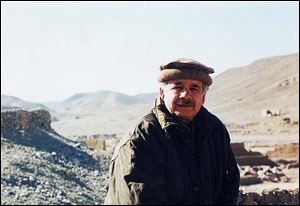
Dr. Hussain pauses during a trip to Afghanistan, after which he wrote a series on the shadowy Taliban, whom he had interviewed in their native language. It was published in The Blade in 2001.
He s been a positive part of the board, quite insightful, and able to ask the right questions. Mr. Brown said, adding that Dr. Hussain was very much involved in strategic planning for the public stations.
The one person not rushing to praise S. Amjad Hussain was Dr. Hussain himself, who said he was surprised, if pleasantly so, by the appointment.
I wasn t seeking it, he said. At this stage of my life, I don t need a job. My plate is full. I live a rather busy and full life.
With characteristic modesty, the physician added, I don t know what I can bring to the table. I can only point to my life, my interest in higher education, literature, history.
University appointments have been known to be political. But as UT s newest trustee noted, what is interesting is that I m a registered Republican. Governor Strickland is a Democrat. However, Dr. Hussain hastened to point out that he is really an independent, who has voted for both Republicans and Democrats.
Politically, socially, and culturally, he thinks of himself as that increasingly rare bird a moderate. In politics, religion, and social issues, I am very much middle-of-the-road.
Son of a civil servant
Sayed Amjad Hussain was born the son of a civil servant in the last years of British rule (Pakistan gained independence in 1947).
He was the seventh of nine children and lived amid an extended family of aunts and other relatives. At times 25 to 30 lived in our rambling house. It was a happy childhood; my [early] memories are wonderful.
Today, only he and one sister survive. His grandfather was a doctor in tribal outposts in parts of Pakistan that still, in many ways, resemble the Wild West. I grew up hearing the stories of my grandfather, and everyone said I had to be a doctor.
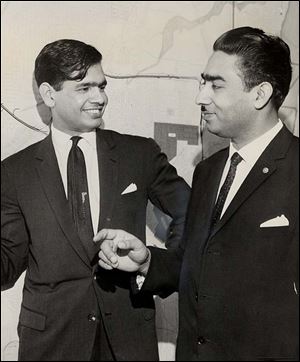
In 1963, Dr. Hussain, at left, chatted with Syed Yusaf Ali Shaw, the mayor of Peshawar, West Pakistan.
When he was 6 years old, his father died and the family fell on hard times. His mother, who had married at the age of 14, was largely illiterate and could read only parts of the Qur an.
I was fortunate. I feel I owe a great debt to Pakistan for a free education. Have I done enough to repay that debt? Hell, no.
Some might disagree, because he has donated hundreds of thousands of dollars worth of medical equipment to his country, and he has returned to Pakistan annually for many years to teach at Khyber Medical College, from which he graduated in 1962.
He said he was a mediocre student and had to repeat a chemistry course in order to qualify for medical school, but once there, he did well.
Toledoan by chance
Becoming an American and a Toledoan happened purely by chance.
He came to the United States in 1963 to become an intern at St. Charles. I came to this country by accident. He had intended to practice medicine in England, but a friend encouraged him to apply for an opening at St. Charles.
Understandably, he had a lot of apprehension about the move.
I had seen movies, and America was Hollywood. I didn t know if I could keep my identity. ... I wanted to be a person of faith.
But to his surprise, he found people were just wonderful. They put me at ease. The common decency of American people is something that nurtured me.
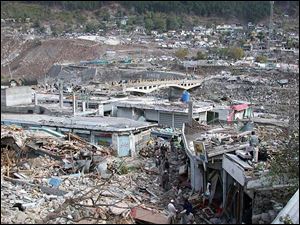
During a visit to the area, Dr. Hussain photographed rubble left by an earthquake that hit the India-Pakistan border in 2005.
Even so, I had to learn American slang, and I did not even know how to sleep in an American-style bed, with inner sheet, outer sheet, etc. I was used to [just] a blanket. It was exciting learning all those things.
In 1964, he became a surgery resident at the old Maumee Valley Hospital (forerunner of the Medical College of Ohio, now the University of Toledo Medical Center). He became a thoracic and cardiovascular surgery resident at Wayne State University s school of medicine in 1968. Then, for four years, Dr. Hussain and his family lived in Pakistan, where he was a surgeon, but he decided to return to the United States in 1974.
He went to a hospital in Pennsylvania, then returned to the Toledo area in 1975.
Dr. Hussain isn t without ego: His curriculum vitae, or resume, is 106 pages long, and details numerous achievements in medicine, religion, academia, journalism, and exploration.
Writing a big passion
One of Dr. Hussain s major passions is writing.
While in high school and college, he wrote plays for Radio Pakistan. I made money at that, he said. If I hadn t gone to medical school, I probably would have been a writer.
He has written 10 books, including a tribute to 15 mentors, from grade school through college, medical school, and in his medical internships.
He has written books on the culture and history of his hometown in Pakistan, histories of medical organizations, and published a collection of essays, including some of the 320 columns he has written for The Blade s op-ed pages.
One of his major contributions was a landmark series on Afghanistan s shadowy Taliban, which was published in The Blade in 2001, just months after he visited there and interviewed many Taliban officials in their native language.
The series, which included much information about Osama bin Laden, was published as a book, The Taliban and Beyond, after the terrorist attacks of Sept. 11, 2001.
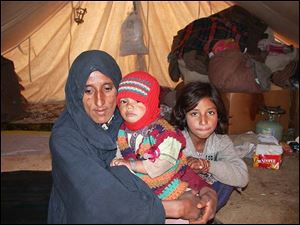
More than 3.3 million people were left injured or homeless after the 2005 earthquake. More than 82,000 people were killed.
His columns range from weighty topics, including religion, politics, and war, to whimsical musings on lighter subjects, from the magic of romance to the demise of the fountain pen.
He has also written a number of magazine articles for The Blade on heart transplants, the Taj Mahal, and the philosophy of a hunter (he is one himself).
But perhaps his toughest columns were those he wrote after his wife, Dorothy, died late last year. They drew responses from around the world.
In one column, he referred to Mrs. Hussain, who died at the age of 62 of ovarian cancer, as his dear friend and soul mate and in another he wrote about his support group of eight widowers adrift on the vast and stormy ocean of grief.
Couple met in hospital
The couple met in 1964 at the old Maumee Valley Hospital, where Dr. Hussain was a surgery resident and Dottie Brown, from Chelsea, Mich., was a student nurse. They married four years later.
Today their daughter, Natasha Hussain-Black, is director of a technology-startup program for Toledo s Regional Growth Partnership. A son, Monie, is a product manager for a pharmaceutical company in California. Their other son, Qarie, is a stage and TV actor in England.
Though he is seemingly always in motion, Dr. Hussain is also a man of many interests and hobbies including photography and calligraphy (in English, Urdu, and Arabic). He collects ancient manuscripts and works of music, literature, mapmaking, and history.
His home on Manley Road in Maumee showcases some of his interests. There are photographs he took on some of his travels, including the expedition he led to find the headwaters of the Indus River in a mountain range in Tibet, 17,000 feet above sea level. Indeed, some of his prize-winning pictures have appeared in calendars, travel magazines, and in exhibitions sponsored by the Victoria and Albert Museum in London and several at the Toledo Museum of Art.
Displayed in his home are rifles including a black-powder muzzle-loader; pages from a 300-year-old prayer book, and photographs of people he admires, including poets, writers, and statesmen. One unusual artifact is a stringed musical instrument, a rabab, banned by the Taliban. He had to smuggle it out of Afghanistan when they were still in power.
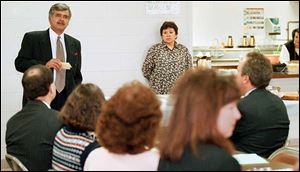
Dr. Hussain speaks to the BCR dinner club at the Islamic Center in 1998.
In Dr. Hussain s view, a university is not a business. It is a community of scholars that stands for the ideals of freedom of thought and expression.
Recently he has had nothing but praise for the current leadership of the universities. We ve had wonderful people at the helm, he said, adding that he thinks President Jacobs has a vision for UT and he believes there are a lot of opportunities to make the university a better place.
He expects to put in a lot of work in his new, unpaid job.
And he has questions he wants answered: What value is the institution to the community? I m not talking about prestige. I m talking about real impact on the community s growth. ... The University of Toledo is in a wonderful position, especially with the merger, and already the university is making liaison with different areas of the world for students and research.
Dr. Hussain may be an officially retired professor, but he still loves to teach.
One of his favorite instruction methods is problem-based teaching, in which he poses a medical case to a group of seven to nine students and simply acts as a moderator while they do all the work. I steer them, he said.
But I let the students do the research under the watchful eye of the instructor.
Now he looks forward to completing his orientation and getting started as a University of Toledo trustee. It s a high honor and a privilege, he said. I would hope to have some ideas and may be able to contribute.
Contact Homer Brickey at:homerbrickey@theblade.comor 419-724-6129.